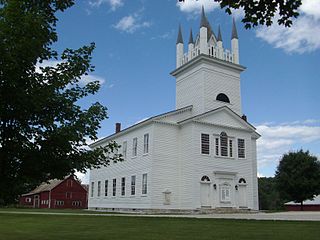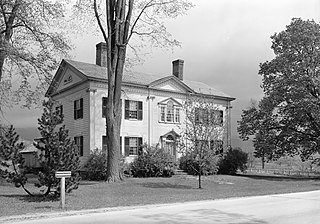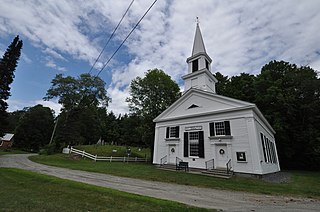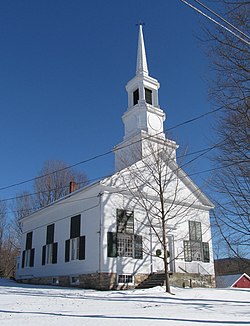
The Addison Community Baptist Church is a historic church building at 4970 Vermont Route 22A in the village center of Addison, Vermont. Built in 1816 and restyled in 1849, it is one of Vermont's oldest Baptist churches, and a good local example of Greek Revival architecture. It was listed on the National Register of Historic Places in 1978 as Addison Baptist Church.

The Osterville Baptist Church is an historic Baptist church building at 824 Main Street in the Osterville village of Barnstable, Massachusetts. The white clapboarded wood-frame structure was built in 1837 for a congregation formed two years earlier. It is one of the older buildings in Osterville, and is a fine example of the Greek Revival with Gothic Revival elements. The church was listed on the National Register of Historic Places in 1987.

The First Congregational Church is an historic church in Stoneham, Massachusetts. Built in 1840, it is a fine local example of Greek Revival architecture, and is a landmark in the town center. It was listed on the National Register of Historic Places on April 13, 1984. The church is affiliated with the United Church of Christ; the current pastor is the Rev. Ken McGarry.

The South Canaan Congregational Church is a historic Congregational church building at Connecticut Route 63 and Barnes Road in the town of Canaan, Connecticut. Built in 1804, it is a remarkably well-preserved example of early Federal period church architecture. It was listed on the National Register of Historic Places in 1983.

The Centre Congregational Church is a historic Congregational church on Province Road in Gilmanton, New Hampshire. Built in 1826–27, it is one of the region's best examples of a late Federal-period church. It was listed on the National Register of Historic Places in 1983.
The Eastbrook Baptist Church and Eastbrook Town House are a pair historic civic buildings on Maine State Route 200 in the center of Eastbrook, Maine. The church, built 1860, and the town house, built 1880, are both late examples of Greek Revival architecture, the latter apparently built in stylistic imitation of the former. The buildings were listed as a pair on the National Register of Historic Places in 1978.

The Oxford Congregational Church and Cemetery is a historic church and cemetery in Oxford, Maine, located on the east side of King Street, 0.2 miles (0.32 km) north of its junction with Maine State Route 121. Built in 1842-3, the church is architecturally significant as a good local example of Greek Revival and Gothic Revival style, and is artistically significant for a decorative stenciled trompe-l'œil artwork on the ceiling and sanctuary end wall. The property was listed on the National Register of Historic Places in 1994.

Florona Grange No. 540 Hall is a historic Grange hall and former church on Monkton Road in Monkton, Vermont. Built in 1811 as the Monkton Borough Baptist Church, it is the second-oldest church in Addison County. it is a fine example of Federal architecture with later Greek Revival additions. Its initial design is based closely on designs published by Asher Benjamin. The building was added to the National Register of Historic Places in 1989.

Union Church, also known as the Union Church of New Haven Mills is a historic church at the junction of River Rd. and East Street in New Haven, Vermont. Built in 1851, it is a fine local example of Greek Revival architecture with added Queen Anne Victorian features, and one of the oldest surviving buildings in a once-thriving mill village. It was listed on the National Register of Historic Places in 2000.

The United Church of Chelsea, previously the Congregational Church of Chelsea, is a historic church on Chelsea Green in Chelsea, Vermont. Built 1811–1813 with later stylistic additions, it is a fine example of Federal period architecture with Greek Revival alterations. Originally built for a Congregationalist group, it now serves as a union church, affiliated with the United Church of Christ. It was listed on the National Register of Historic Places in 1976.

The Post Mills Church is a historic church at 449 Vermont Route 244 in the Post Mills village of Thetford, Vermont. Built in 1818 and remodeled in 1855, it is an excellent example of Greek Revival architecture, with extremely rare late 19th century stencilwork on its interior walls and ceiling. It was listed on the National Register of Historic Places in 1992. The congregation is affiliated with the United Church of Christ.
The Holland Congregational Church is a historic church on Gore Road in Holland, Vermont. Built in 1844, it is a prominent local example of Greek Revival architecture, and is the town's only surviving 19th-century public building. It was listed on the National Register of Historic Places in 1986.

Sudbury Congregational Church, also known as the Sudbury Meetinghouse, is a historic church and town hall at 2702 Vermont Route 30 in Sudbury, Vermont. When it was built in 1807, it was a nearly exact replica of Plate 33 in Asher Benjamin's 1805 Country Builders Assistant. It was listed on the National Register of Historic Places in 1977.

The New Ipswich Town Hall is a historic academic and civic building on Main Street in the center village of New Ipswich, New Hampshire. The 1+1⁄2-story wood-frame structure was built in 1817 to serve the dual purpose of providing a town meeting place, and to provide space for a private academy. The building has been little altered since 1869, when it was substantially reconfigured solely for town use. The building was listed on the National Register of Historic Places in 1984.

The Temple Town Hall, also known as the Union Hall and the Miller Grange Hall, is a historic municipal building in the center of Temple, New Hampshire. Built in 1842, it is a fine example of Greek Revival architecture, which has served the community as a church, Grange hall, and town hall. It continues to be used for social functions. The building was listed on the National Register of Historic Places in June 2007, and the New Hampshire State Register of Historic Places in April 2007.

The Munro-Hawkins House is a historic house on Vermont Route 7A in southern Shaftsbury, Vermont. Built in 1807, it is a well-preserved example of transitional Georgian-Federal period architecture, designed by local master builder Lavius Fillmore. It was listed on the National Register of Historic Places in 1973.

The Ripton Community House, formerly the Ripton Congregational Church, is a historic former church and present community hall on Vermont Route 125 in the village of Ripton, Vermont. Built in 1864 for a Congregationalist church, it has since served as a community clubhouse and town-owned meeting hall, and is a fine local example of vernacular Greek Revival architecture. It was listed on the National Register of Historic Places in 1973.

Monkton Town Hall is a historic government building on Monkton Ridge Road in Monkton, Vermont. Built in 1859, it is a fine local example of Greek Revival architecture. For many years it was the site of town meetings, and it now houses the town offices. It was listed on the National Register of Historic Places in 1978.

The West Fairlee Center Church is a historic church building at Middlebrook and Bear Notch Roads in West Fairlee, Vermont. Built in 1855, it is a fine and little-altered example of rural Greek Revival architecture, also notable for the association of its congregation with Nathaniel Niles, a prominent local minister, landowner, and politician. It was listed on the National Register of Historic Places in 2002.

The Huntington Lower Village Church, also known historically as the Huntington Union Meeting House, is a historic church building at 2156 Main Road in Huntington, Vermont. Built in 1870, it is a fine late example of Greek Revival architecture. It now houses the Huntington Public Library and serves as a community center. It was listed on the National Register of Historic Places in 1984.





















